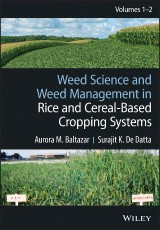Details

Weed Science and Weed Management in Rice and Cereal-Based Cropping Systems, 2 Volumes
1. Aufl.
|
264,99 € |
|
| Verlag: | Wiley |
| Format: | |
| Veröffentl.: | 24.03.2023 |
| ISBN/EAN: | 9781119738848 |
| Sprache: | englisch |
| Anzahl Seiten: | 880 |
DRM-geschütztes eBook, Sie benötigen z.B. Adobe Digital Editions und eine Adobe ID zum Lesen.
Beschreibungen
<p>The book presents discussions on: <ul><li> Biology and ecology of major troublesome weeds infesting rice, wheat, corn, soybean, focusing on different cropping patterns in both tropical and temperate cropping systems and science-based weed management practices involving chemical, non-chemical, biological, integrated methods. </li> <li> Herbicides used, with their most recent classification, identification of new target sites, mechanisms and modes of action and how and why weeds evolve resistance to herbicides.</li> <li> New concepts, new paradigms and new technologies to manage evolution of resistance to herbicides including weed genomics, bioherbicides and allelochemicals. </li> <li> Highly recommended for students, teachers, researchers, agronomists, horticulturists, crop physiologists, and crop protection specialists in tropical and temperate agricultural systems, particularly in areas where major tropical weeds are posing potential threats to temperate agricultural systems.</li></ul>
<p>Foreword</p> <p>Preface</p> <p> </p> <p>Chapter 1 Weeds: history, definition, classification, harmful and beneficial effects</p> <p>Chapter 2 Weed biology: Weed growth, reproduction, nature of crop-weed competition</p> <p>Chapter 3 Weed ecology: Weediness and adaptation</p> <p>Chapter 4 Rice and Rice-Based Cropping Systems</p> <p>Chapter 5 Mechanical, Cultural, Physical and Integrated Weed Management</p> <p>Chapter 6 Chemical control: Principles of Herbicide Use</p> <p>Chapter 7 Herbicides: Classification, uses, modes of action and target sites</p> <p>Chapter 8 Herbicide-resistant weeds in rice: history, causes, management</p> <p>Chapter 9 Biological control and use of bioherbicides</p> <p>Chapter 10 Biology and management of some problem weeds</p> <p>Chapter 11 Rice-Wheat and other Wheat-based Cropping Systems </p> <p>Chapter 12 Corn-soybean and rice-corn-soybean cropping systems</p> <p>Chapter 13 Weed science and weed management: current issues and future perspectives</p> <p> </p> <p>Index</p>
<p><b>Aurora M. Baltazar,</b> first author, is Adjunct Professor at the Institute of Weed Science, Entomology and Plant Pathology, University of the Philippines at Los Banos where she taught and did research on weed biology, weed ecology and herbicide behavior in plants and soils, including ways to improve selectivity of postemergence grass herbicides in emerged rice and grass weeds. She was Postdoctoral Research Associate at the University of Arkansas, where she conducted the first studies that confirmed the resistance of barnyardgrass to propanil, which was first observed in rice fields in Arkansas, and determined alternative strategies for its control. She served as the Asian Site Coordinator of the Integrated Pest Management Collaborative Research Program where she helped determine input-reducing weed management strategies in rice-vegetable cropping systems in tropical Asia. Among her notable awards include the Weed Science Society of America Honorary Member Award and International Achievement Award from the International Weed Science Society. Her most recent award comes from her Alma Mater, North Carolina State University, where she was recipient of the NCSU Outstanding Alumni Award for 2022. <p><b>Surajit K. De Datta,</b> co-author, is Adjunct Senior Faculty, Center for the International Research, Education and Development (CIRED), Virginia Tech, where he served for 20 years as the Director of the Office of International Research, Education, and Development (OIRED), Virginia Tech. Before joining Virginia Tech, he served as the Principal Scientist and Head, Department of Agronomy, International Rice Research Institute (IRRI) for 27 years. During his tenure at IRRI, he served as an Adjunct Academic Faculty in the Universities of the Philippines, India, United States, United Kingdom and Germany. With Dr. De Datta’s guidance, 77 graduate students from 23 countries received M.S./Ph.D. degrees. During his professional career for 49 years, Dr. De Datta received numerous national and international awards. A few examples are: Presidential Citation from President Gloria Macapagal Arroyo from the Philippines, for his contribution to the Green Revolution in rice in Asia. He was elected Fellow of the American Society of Agronomy (ASA), Crop Science Society of America (CSSA) and American Association for the Advancement of Science (AAAS) among others. He was awarded International Service Awards from ASA and CSSA. For his contribution to research and education and Global Food Security, received in 1998 from his Ph.D. Alma Mater, the University of Hawaii, the Outstanding Alumni Award. During his long professional career, Dr. De Datta published 366 scientific papers including 96 papers in Weed Science, 3 books and numerous book chapters.
<p>The book presents discussions on: <ul><li> Biology and ecology of major troublesome weeds infesting rice, wheat, corn, soybean, focusing on different cropping patterns in both tropical and temperate cropping systems and science-based weed management practices involving chemical, non-chemical, biological, integrated methods. </li> <li> Herbicides used, with their most recent classification, identification of new target sites, mechanisms and modes of action and how and why weeds evolve resistance to herbicides.</li> <li> New concepts, new paradigms and new technologies to manage evolution of resistance to herbicides including weed genomics, bioherbicides and allelochemicals. </li> <li> Highly recommended for students, teachers, researchers, agronomists, horticulturists, crop physiologists, and crop protection specialists in tropical and temperate agricultural systems, particularly in areas where major tropical weeds are posing potential threats to temperate agricultural systems.</li></ul>

















